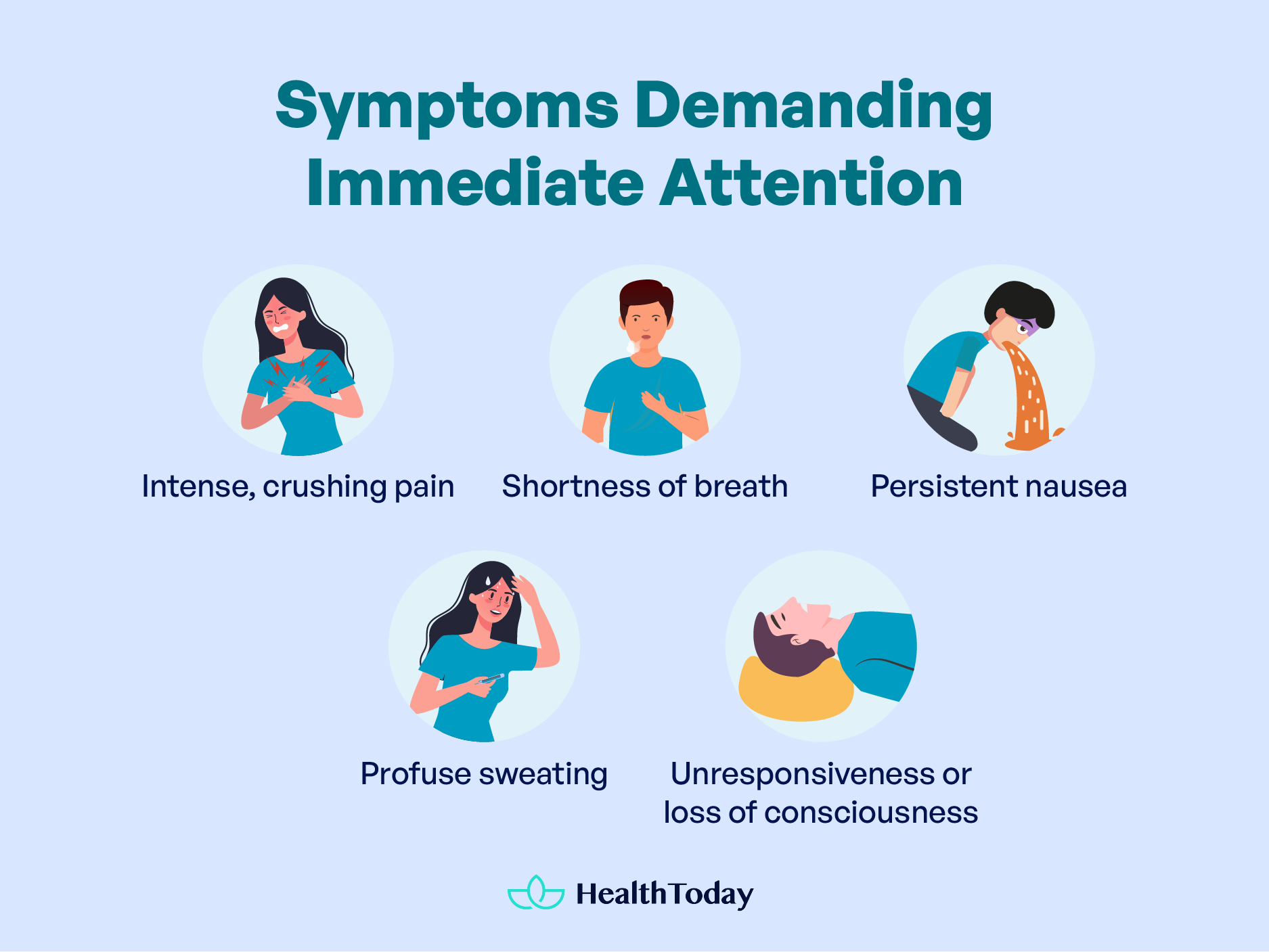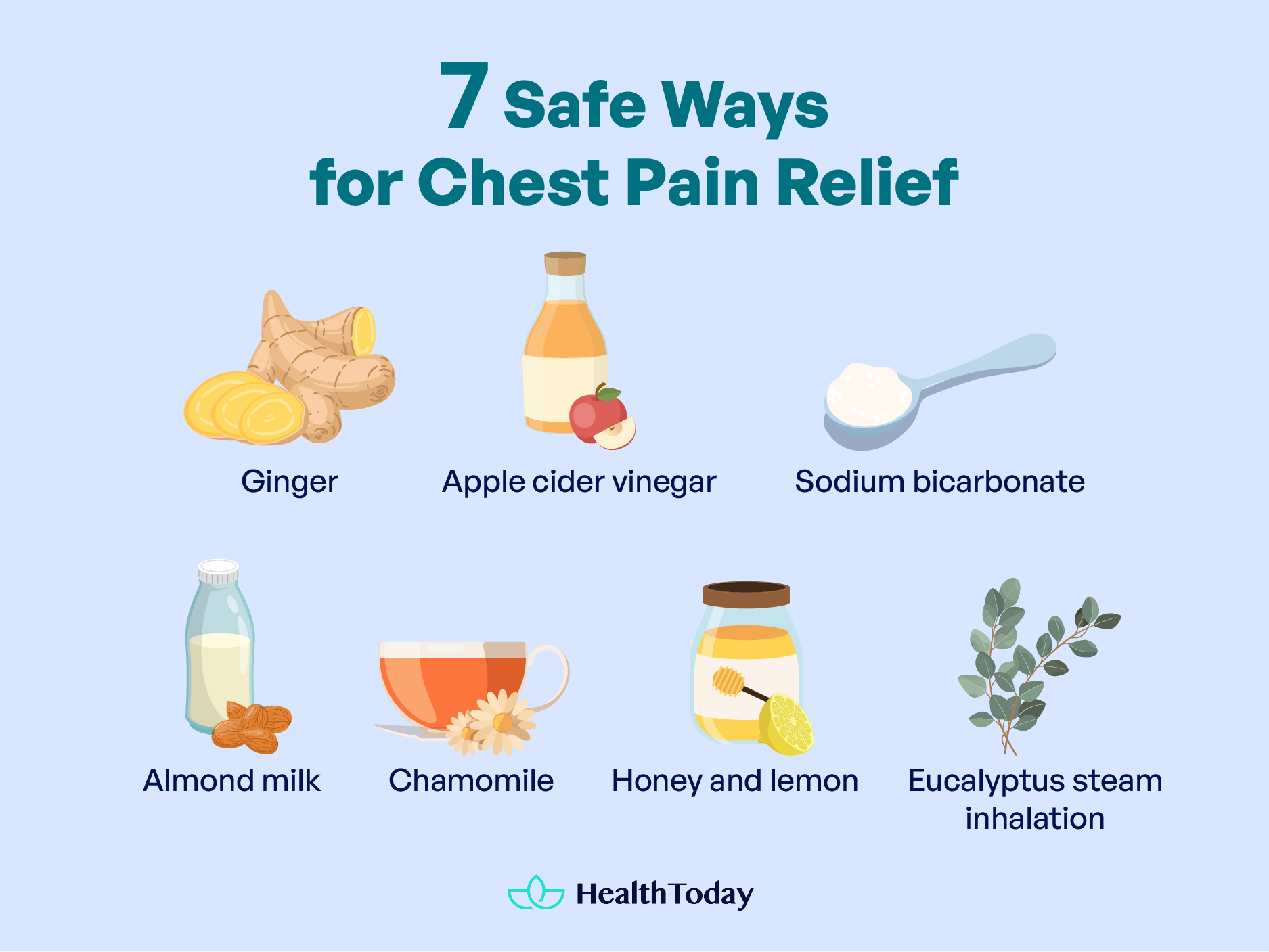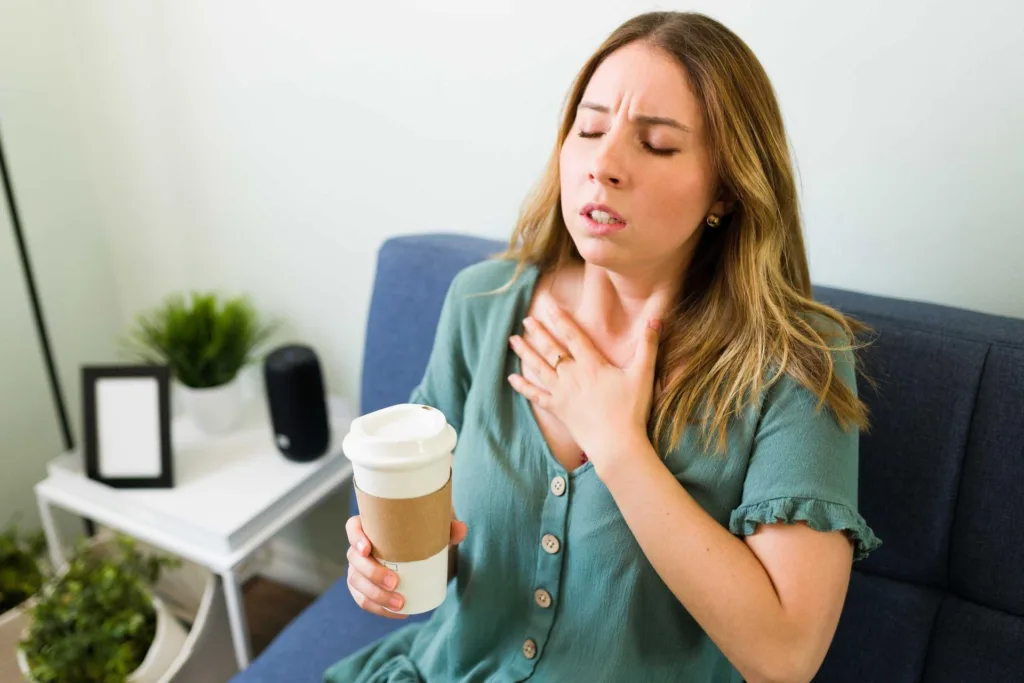Table of Contents
The rib cage houses various organs, such as the heart, lungs, major arteries and veins, and the esophagus, all susceptible to chest pain. Discomfort in this area, often associated with serious conditions such as angina pectoris and acute myocardial infarction, is normally consulted in the emergency department.
Besides these emergency cases, there are other common causes, such as muscle pain, chondritis, stomach discomfort, gastroesophageal reflux disease, and psychogenic factors. But the question is, “How to get rid of chest pain?”
In this article, we will discuss the most common causes of chest pain and how to identify them. We also dive into what to do to relieve chest pain at home.
What is chest pain? Causes and alarm symptoms
Chest pain occurs in the thorax area (commonly known as rib cage or chest area), which can be sharp or dull, sudden or progressive onset, lasts from minutes to hours, and can radiate to other places like your arm, neck, and jaw. It all depends on the cause of the pain.

Possible causes of chest pain
Thoracic pain can stem from various sources within the thoracic cavity, housing vital organs such as the heart, lungs, major arteries and veins, and the esophagus. While alarming, not all chest pain indicates a cardiac emergency. The causes include:
- Cardiac issues: Angina, heart attack, pericarditis (inflammation of the heart tissue), and other cardiovascular conditions.
- Musculoskeletal factors: Muscle strains, costochondritis (chest wall inflammation), or rib injuries.
- Gastrointestinal causes: Acid reflux, gastritis, or esophageal spasms.
- Pulmonary conditions: Pneumonia, bronchitis, pleurisy (too technical), or, less frequently, pulmonary embolism.
- Psychological factors: Anxiety, panic attacks, or stress.
Identifying the cause involves considering the associated time of progression, duration, and symptoms, such as shortness of breath, nausea, or pain characteristics (sharp, burning, or squeezing).
When to call 911? Symptoms demanding immediate attention
When it comes to chest pain, identifying possible signs of a heart attack or unstable angina is important for immediate action (1).

- Intense, crushing pain: A feeling of intense, crushing pain in the chest, particularly if it extends to the left arm, jaw, or back, may indicate a potential heart attack.
- Shortness of breath: Chest pain accompanied by difficulty breathing or shortness of breath is a critical sign requiring immediate attention.
- Persistent nausea: Ongoing nausea alongside chest pain is an alarming symptom that should not be ignored.
- Profuse sweating: Excessive sweating, especially with chest pain, is a significant indicator of a potential cardiac emergency.
- Unresponsiveness or loss of consciousness: If the person becomes unresponsive or loses consciousness during chest pain, it is a critical situation requiring urgent medical assistance.
Persons with these symptoms or a history of cardiac and risk factors should call 911 immediately.
Home remedies for chest pain: 7 safe ways for chest pain relief
Chest pain can have various causes, and it is important to differentiate whether it is of cardiac origin. If the pain increases when breathing, you can locate the pain with a finger at an exact point, or if the pain increases with movements, the pain is likely non-cardiac and either due to muscular or rib causes. If in doubt, consult a doctor; they will diagnose the exact cause of your pain.
Among the most common non-cardiac causes of chest pain, the following conditions also cause chest pain:
- Indigestion
- Heartburn
- Acid reflux
- Chest pains caused by a bad cough
- Chest pains caused by heavy smoking
If you’re wondering what to do about non-emergency chest pain, here are some home remedies you can explore:

Ginger
Ginger contains chemicals called gingerols and shogaols that may help speed up stomach contractions, promote the passage of food through the stomach, and relieve symptoms of indigestion such as gas, the feeling of fullness after a meal, burning, or pain in the upper abdomen or chest (2).
Besides, the chemicals in ginger can also help reduce nausea, vomiting, and diarrhea. You can add ginger to your food or drink it as a tea.
Apple cider vinegar
Apple cider vinegar (ACV) is a type of vinegar made from the fermentation of crushed apples. It contains acetic acid, enzymes, potassium, and antioxidants. It has been used as a home remedy for indigestion, blood sugar regulation, and body weight management (3).
It can also relieve stomach and thoracic pain caused by indigestion (4). For its use, you need to dilute one tablespoon of ACV in the water and drink it before meals. However, you should do this with caution as ACV is acidic and may cause irritation if consumed undiluted. Although some people find relief, scientific evidence is limited, and you should consult a health professional if you experience frequent indigestion.
Sodium bicarbonate
Baking soda, an alkaline substance, can neutralize excess acid, offering quick relief from heartburn. By dissolving a teaspoon of baking soda in a glass of water and consuming it, it is intended to raise the pH of the stomach. However, its use should be moderated since this substance contains sodium, and when you consume it in excess, it can lead to negative consequences, especially for people with hypertension. Continued use without the supervision of a healthcare professional is not recommended as it may alter the body’s acid-base balance (5).
Despite its widespread use in households, medical evidence is limited.
Almond milk
Almond milk is often considered a good alternative to dairy milk for individuals with acid reflux because it is naturally alkaline and may help neutralize stomach acid (6). It’s lower in fat than regular milk and doesn’t contain lactose, which can benefit people who are intolerant to lactose or cow milk allergies (7). If you have heartburn, a glass of almond milk can ease the discomfort.
Chamomile
Chamomile tea has been traditionally used to alleviate indigestion due to its anti-inflammatory and muscle-relaxant properties. It can provide relief from stomach discomfort, reduce swelling, and stimulate the production of digestive enzymes, thereby facilitating digestion (8).
Furthermore, chamomile helps balance stomach acid levels, making it beneficial for those experiencing acidity after meals. You can prepare chamomile tea using a tea bag or dried flowers, let it steep, and drink it slowly after meals.
Honey and lemon
A persistent or hard cough is one of the most frequent causes of chest pain. It becomes evident when the pain worsens with coughing. The combination of honey and lemon with warm water is a popular home remedy to relieve cough and throat irritation. Honey has soothing and antibacterial properties that can help reduce irritation, while lemon provides vitamin C, which is beneficial to the immune system (9).
Mixing a tablespoon of honey with lemon juice in warm water not only soothes a sore throat but can also help relieve a cough. This home remedy is most effective for dry or irritating coughs (10). However, if the cough persists or worsens, it is recommended to consult your doctor.
Eucalyptus steam inhalation
The use of steam with eucalyptus leaves is a widely used method, inherited from past generations, to relieve cough and sore throat and decongest the nasal passages. This home remedy can be beneficial for patients with chest congestion, facilitating the expectoration of mucus (11).
Performing it up to three times a day is recommended until you see improvement. However, if the cough persists or worsens, it is essential that you consult a physician for a thorough evaluation.
It is important to note that these home remedies, whether for indigestion, heartburn, or cough, should be used with caution and should not replace consultation with a physician for an accurate evaluation and proper treatment from your doctor. Besides, there are several over-the-counter medications that you can discuss with your doctor or pharmacist.
For gastrointestinal discomfort, baking soda, ginger tea, and apple cider vinegar can be useful. On the other hand, for coughs, lemon tea with honey, eucalyptus steam, or over-the-counter medications can be used.
How to treat angina naturally?
Angina Pectoris and Myocardial Infarction are types of Ischemic Heart Disease, a condition caused by the deterioration and obstruction of the coronary arteries, preventing proper blood supply and oxygen from reaching the heart.
Unlike myocardial infarction, angina develops progressively due to a partial obstruction of the blood flow, resulting from the gradual deterioration of the cardiac arteries. The risk of angina increases due to smoking, being overweight, bad eating habits, stress, and lack of physical exercise. It is classified into two types based on whether it occurs at rest or during physical exertion:
- Stable angina: Chest pain occurs during physical activity and may radiate to other areas like the jaw, shoulder, throat, back, left arm, or wrist. The pain is calm at rest or with medication, such as nitroglycerin.
- Unstable angina: Chest pain manifests at rest and has a longer duration compared to stable angina. It may extend to the arms, neck, back, and jaw. In most cases, neither rest nor medication alleviates the pain, and it tends to intensify. Urgent treatment is crucial, as it can lead to a myocardial infarction or sudden death.
For diagnosis, your doctor will conduct a comprehensive medical history examination, an electrocardiogram, laboratory tests, and possibly a chest X-ray. If confirmed, medication, such as statins, aspirin, and beta-blockers, will be prescribed based on your condition.
You can take these four natural measures at home to help alleviate symptoms and enhance your quality of life (12):
Quit smoking
Abandoning tobacco significantly reduces the risk of heart attacks, improves blood flow by lowering artery inflammation, and eases stress on the heart. This may also enhance respiratory capacity and blood pressure values (13). E-cigarettes (smokeless tobacco) and vaping products are also proven to impact cardiovascular health (14). Thus, you should consider avoiding these products.
Start exercising
Light to moderate exercise enhances the quality of life after a cardiac episode. Supervised rehabilitation exercises have shown improvements in chest pain and increased exercise tolerance (15).
Reduce stress
Stress and anxiety can trigger chest pains in individuals with angina. Adopt relaxation techniques such as meditation, cognitive-behavioral therapy, and deep breathing exercises.
Healthy diet
A heart-healthy diet includes healthy fats (avocados, nuts) and omega-3-rich foods (fatty fish, flaxseeds). Studies indicate that high doses of omega-3 fatty acids can reduce adverse cardiac events, including myocardial fibrosis (16).
By incorporating these changes alongside medical treatment provided by your cardiologist, you can improve your quality of life, allowing for more pain-free periods, increased exercise tolerance, and prevention of complications such as acute myocardial infarction.
What helps a tight chest after eating?
Eating smaller, more frequent meals and avoiding lying down immediately after eating can help alleviate tightness in the chest after meals. Identifying and avoiding triggering foods that may cause indigestion can also be beneficial.
Why do I feel pain in my chest after walking?
Chest pain after walking may be due to various reasons, including issues related to the heart, lungs, or muscles. It’s important to consult a healthcare professional to determine the cause and receive appropriate treatment.
What is a good remedy for chest pain after eating spicy food?
Drinking milk, eating yogurt, or consuming antacids may help alleviate chest pain after eating spicy food. Avoiding large spicy meals and drinking plenty of water can also be helpful.
What is the chest pain killer tablet named?
There are various medications for chest pain, and the appropriate one depends on the cause. Nitroglycerin is commonly used for chest pain related to heart conditions such as angina. However, it’s important to consult with a healthcare professional before taking any medication.
What are natural remedies for heart blockage?
While there is no proven natural remedy for heart blockage, adopting a heart-healthy lifestyle, including a balanced diet, regular exercise, stopping tobacco products, and stress management, can contribute to overall cardiovascular health. Consult with a doctor for an integral evaluation.
Should I ignore chest pain?
No, chest pain should not be ignored. It can be a symptom of serious medical conditions, including heart-related issues like heart attack or angina. Seek immediate medical attention if you experience chest pain, especially if it is severe, persistent, or accompanied by other symptoms such as shortness of breath or nausea.
How long should my chest hurt?
The duration of chest pain can vary depending on the cause. If chest pain persists or is severe, it’s crucial to consult with a healthcare professional for a proper diagnosis and appropriate treatment. Ignoring persistent chest pain can have serious consequences.
Summary
Chest pain can have various causes, which is why it is divided into cardiac and non-cardiac for better interpretation. Now you know the answer to the question, “How to get rid of chest pain?”
Oppressive pain that radiates to the jaw, neck, or left arm, accompanied by profuse sweating and shortness of breath, suggests acute myocardial infarction, requiring an immediate call to 911. In contrast, pains that are localized with a finger, increase with movement, or worsen with coughing are suggestive of non-cardiac causes. For the latter, several home or over-the-counter remedies can provide relief.
Detecting angina symptoms early helps prevent very serious complications, such as acute myocardial infarction. Lifestyle changes are important to accompany the medication that will be provided by your cardiologist.
It is important to note that no home remedy or information in this article replaces the advice of the doctor. The medical professional will determine your condition and provide appropriate treatment.

















Comments
0